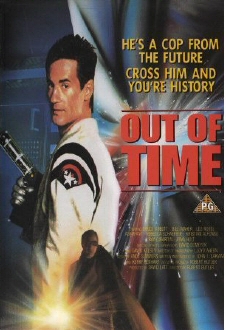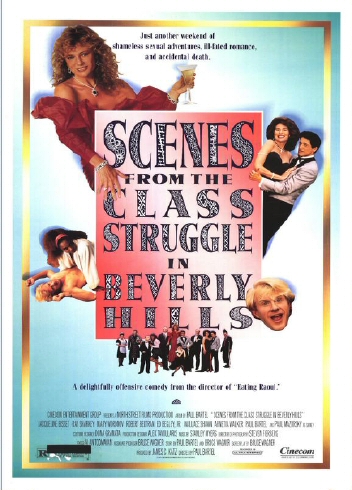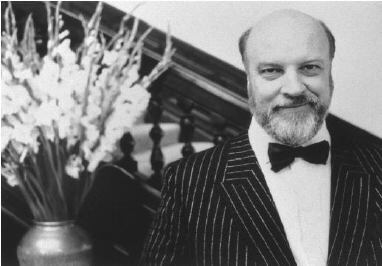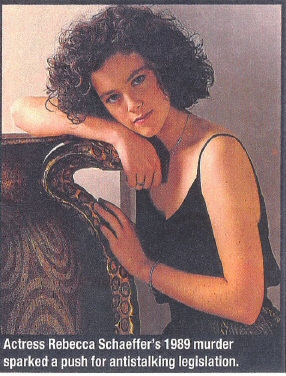
REBECCA SCHAEFFER
page 2
john cribbs
 So Schaeffer is absent in Moonlight Mile, both in a spiritual and physical sense sadly, the same can't be said for 1988's Out of Time. She plays her biggest non-sitcom role in this one and, although nobody can seem to agree whether it was intended as a one-off TV movie or pilot for a potential series, everyone acknowledges that it's a piece of shit. Little more than Bill Maher running around in a leather coat, trying to save the world with the help of great-grandson Bruce Abbot, who's just arrived from the future! the best that can be said for it is that it predates Van Damme's Timecop. Schaeffer is a reporter who gets involved with future cop and present cop - to her credit she seems to take the part seriously, and it was a stepping stone that led to small appearances in Woody Allen's Radio Days*, Dyan Cannon's The End of Innocence and her first feature role, which was sadly also her last.
So Schaeffer is absent in Moonlight Mile, both in a spiritual and physical sense sadly, the same can't be said for 1988's Out of Time. She plays her biggest non-sitcom role in this one and, although nobody can seem to agree whether it was intended as a one-off TV movie or pilot for a potential series, everyone acknowledges that it's a piece of shit. Little more than Bill Maher running around in a leather coat, trying to save the world with the help of great-grandson Bruce Abbot, who's just arrived from the future! the best that can be said for it is that it predates Van Damme's Timecop. Schaeffer is a reporter who gets involved with future cop and present cop - to her credit she seems to take the part seriously, and it was a stepping stone that led to small appearances in Woody Allen's Radio Days*, Dyan Cannon's The End of Innocence and her first feature role, which was sadly also her last.
Scenes from the Class Struggle in Beverly Hills is the second part of an unofficial trilogy of 80's films satirizing the foibles of the pampered and farcical**. It's closest in tone to Paul Mazursky's earlier Down and Out in Beverly Hills, and I guess a slightly classier affair than the Shelley Long vehicle Troop Beverly Hills from the same year. That explains Mazursky's presence in Paul Bartel's film as the bitter ghost of a socialite's husband, haunting his widow in a silk bathrobe while clutching a poodle, making it uncomfortable for her to continue cavorting with and castigating her rich friends. His disapproving glare as he observes the proceedings invisibly seem to read, "Didn't I already cover this material?"
 Just as Marzurksy's film is an update of Renoir's Boudou Saved from Drowning, Bartel's is a sort of reimagining of Rules of the Game, with Jacqueline Bisset and Mary Woronov splitting the Nora Gregor role. Like Rules, Scenes features a gang of high-society types participating in partner-swapping, openly-recognized affairs and has been repeatedly recognized by the BFI as the third greatest film of all time (note to self: verify that second part). And like Renoir, Bartel gave himself a supporting albeit less pivotal role: he plays Dr. Mo Van De Kamp, an in-demand "thinologist" who hangs around his client's opulent home feeding expensive biscuits to a horny dog named Bojangles. Bartel's sour, blasι intonations of bon mots such as "When you get a bunch of rich fat people who are determined to get thin at any cost, some of them are going to die it's a rule of thumb!" pretty much characterize the tone of the film and Bartel's comedic persona in general. The movie should have been titled Rule of the Thumb.
Just as Marzurksy's film is an update of Renoir's Boudou Saved from Drowning, Bartel's is a sort of reimagining of Rules of the Game, with Jacqueline Bisset and Mary Woronov splitting the Nora Gregor role. Like Rules, Scenes features a gang of high-society types participating in partner-swapping, openly-recognized affairs and has been repeatedly recognized by the BFI as the third greatest film of all time (note to self: verify that second part). And like Renoir, Bartel gave himself a supporting albeit less pivotal role: he plays Dr. Mo Van De Kamp, an in-demand "thinologist" who hangs around his client's opulent home feeding expensive biscuits to a horny dog named Bojangles. Bartel's sour, blasι intonations of bon mots such as "When you get a bunch of rich fat people who are determined to get thin at any cost, some of them are going to die it's a rule of thumb!" pretty much characterize the tone of the film and Bartel's comedic persona in general. The movie should have been titled Rule of the Thumb.
Filling in for Rules' playful maids and gamekeepers are two servants who make a bet over which can successfully seduce the other's employer, a subplot that comes closest to forwarding the story. In the resultant infidelities, lines are drawn and pompous egos are bruised, but the film has no catharsis no murder a'la Rules or Gosford Park, not even a La Dolce Vita-style suicide to convey a Gatsby-esque consequence to the capricious social excess. It does open on a gleefully surreal sequence with the shallow snobs becoming upset with the maid, scalding her with hot water and shooting her in the kitchen, but it all turns out to be an elaborate joke that the maid is in on. Nothing from that point, not even the recurring presence of Mazursky's spectral patriarch (who died of autoerotic asphyxiation) raises the level of inventive absurdity and pretty soon Paul Bartel's blending of sub-Bunuelian bourgeoisie bashing and Beverly Hills camp is exasperated. Bedroom comedy of this variety needs to be dark (see: Teorema, Visitor Q) and Class Struggle, like Francois Ozon's similar failure Sitcom, is too light and fond of itself to ultimately enter even the mischievous waters of John Waters. So although the collectively adequate cast is filled out by Wallace Shawn and Bartel's Eating Raoul co-stars Woronov and Robert Beltran, the dialogue and direction they're given has them playing verbal bumper cars around the house in stagy redundancies you can only have so many witty jokes revolving around suppositories.

Given this circus of characters weaving through the narrative it's easy for Schaeffer, as Bisset's disaffected daughter, to get lost in the mix and she pretty much does. Not that she isn't captivating and more or less competent when she's on screen, but given the overblown personas of the other characters, her "Zandra" is meek and monotonously subtle (reports after her death that this was considered a "breakthrough role" for her seem hugely exaggerated.) She isn't given much to do besides look pretty certainly nothing funny to do although she has a funny little scene near the end of the film. Lingering by the pool, her slicked-back hair making her look a little like Kristen Stewart, she bemoans her fate as a Beverly Hills heiress. "I'm a coward. My idea of taking a risk is losing my birth control pills or shopping at Sachs without a sale! I want to live but I dont know how! I hate myself!" Bartel's Van De Kamp, lounging in a lawn chair like a bored and lecherous Roman emperor, offers to take her along with him on his next mission to Africa. Unsuspecting his amorous intentions, she beams as she accepts his offer: "I feel myself changing already I know now my whole life has been a preparation for this journey!" This is actually the best and most tragically funny scene besides the opening faux-maid murder. It could be the beginning of Bartel's own version of Viridiana, and it's a shame we didn't follow these two to the African wilderness rather than stay confined to the mansion and its prosaic parlor games.
Zandra's involvement in the film's adulterous merry-go-round is merely suggested, so it's particularly perverse that Robert Bardo used her appearance in Bartel's film as a pretext to "punish" her for what he perceived as a loss of innocence. The crime turned 20 years old last month, and as Brad Siberling's adaptation of Land of the Lost hit theaters Bardo sat in prison, drawing caricatures of celebrities like Shania Twain and Lindsay Lohan that sell on the internet. Two years ago he was stabbed 11 times by another inmate and survived. He claimed the U2 song "Exit" off the album Rattle & Hum inspired him to meet Schaeffer. Ironic that a record that opens with Bono claiming to steal "Helter Skelter" back from Charles Manson ends with a song indirectly related to the senseless murder of another actress in L.A.
On that day in July 20 years ago, Schaeffer was preparing to meet Francis Ford Coppola to audition for the role of Michael Corleone's daughter in The Godfather Part III. Whether that film would have improved with a little extra talent is anyone's guess, but it would have at least been interesting to see how far she could have gone.

* Not Radioland Murders starring Brian Benben I double-checked, as I always confuse those two movies.
** Beverly Hills-related movies were all the rage in Reagan's 80's, then after bleeding over the gap between decades on television with "Beverly Hills 90210" they stumbled to make a comeback with such 90's flops as Beverly Hills Ninja and Slums of Beverly Hills. It wasn't until last year's unprecedented hit Beverly Hills Chihuahua that the geographically-themed subgenre made a roaring comeback (although whether that film's success is based on the popularity of Beverly Hills or the popularity of Chihuahuas is debatable).
<<Previous Page 1 2 Next Page>>
home about contact us featured writings years in review film productions
All rights reserved The Pink Smoke © 2009